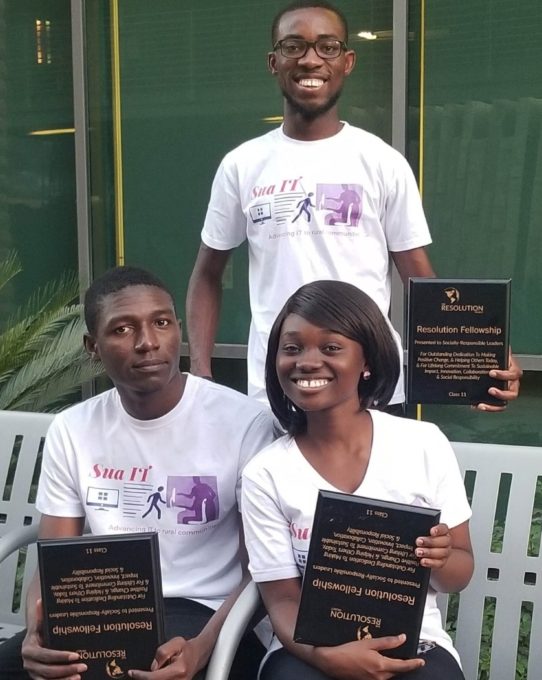
Bridging the ICT Gap for Rural Children in Ghana
Mastercard Foundation Scholars and The Resolution Social Venture Challenge
From a small office in Accra, Ghana, Golda Afoakwa, Richard Sewor, and Douglas Amoo-Sargon are packing laptops, textbooks, a projector, a generator, and other gadgets into a van. The team ensures that the car is in good mechanical condition and has enough fuel to drive the long, rough distance into the neighbouring rural areas.
The three young Ghanaians, students at Arizona State University in the United States, are the founders of Sua IT, a venture which will improve computer literacy among rural Ghanaian youth, allowing them to catch up to children in the country’s urban communities.
The Sua IT team arrives at a remote rural secondary school, ready for a long ICT training session. With the help of teachers and volunteers, setup is done in one of the school halls, where a generator-powered projector is connected to a computer and the images appear on the wall.
After the introductory lessons, the students form groups and each group is allocated a laptop with one or two volunteers to take them through the practical session. Once done, they come back to the workshop session to be evaluated and are encouraged to ask questions of the training team. At the end of the training, a group of teachers and students with good computer skills is elected to help the rest of the students continue learning computer skills as they wait for the next training workshop.
“Most children in rural communities in Ghana do not get practical knowledge in ICT. The urgency for which these children must gain such knowledge has been clearly stated in the government’s ICT syllabus as an important and basic tool needed by every child in Ghana. However, we see most children not having such privilege,” said Golda.
“ICT is a course that needs to be taught with hands-on experience to help students gain an in-depth understanding, but it does not happen for most rural schools,” said Richard.
“Research conducted by Maxwell Peprah on ICT education in Ashanti Region, Ghana, in 2016 showed that 96.1 percent of students did not have labs for practical training in ICT. Most students did not have enough books, computers, and the internet. A lack of access to the internet and electricity were major causes that prevented ICT expansion to the rural communities. Sixty-five percent of students found it difficult to understand the course because they didn’t have the practical knowledge of technology,” continued Richard.
Sua IT will promote ICT education in rural communities, benefiting between 1,000 and 1,500 children every year and targeting at most four schools in one year. The team is also looking for partners to acquire enough computers for each student during the training.
“We will focus on students in levels one to three in the junior high school classes. We currently have about six headmasters who are willing to have their schools benefit from this project,” said Richard.
Sua IT won the Resolution Social Venture Challenge in 2018, a competition that rewards compelling leadership and promising social ventures led by youth. These young leaders earned a fellowship that includes seed funding, mentorship, and access to a network of young global change-makers to pursue impactful projects in their communities. A collaboration between the Mastercard Foundation and The Resolution Project, the Resolution Social Venture Challenge provides a pathway to action for socially responsible young leaders who want to create change that matters in their communities.
“We want every rural Ghanaian teenager to comfortably use technological products. We also want them to benefit from the internet by exposing those students to global and societal issues, as well as encouraging them to develop solutions to the challenges they’ve observed in their community,” said Golda.
With such skills, the team believes that it is creating a community of thinkers who can harness the power of technology to become change-makers in society.
“The knowledge on how to use information to create solutions is critical to our nation’s development. Through ICT training, we can enable Ghanaian youth to grow and learn. We see our project as an opportunity that other youth in Africa could adopt to improve digital literacy and ICT education,” said Douglas.
Golda, Richard, and Douglas feel lucky to be among the Scholars whose education is supported by the Mastercard Foundation Scholars Program, which awards scholarship on the basis of academic talent, social consciousness, and leadership qualities. It was through Scholars Program networks that they were first exposed to the Resolution Social Venture Challenge.
“Through the scholarship, I am now completing my master’s degree as well as benefitting from experiencing different cultures, exposure, deepened knowledge, and practical training. Being a Scholar and a Social Venture Challenge winner have been great achievements in my life,” said Golda.
“The Mastercard Foundation made it possible for me to meet my wonderful team of fellow Scholars and to found Sua IT for our community’s social good. This social venture is a chance for us to give back to our communities. I am proud of these accomplishments,” said Richard.
“Through Sua IT, I believe that we are giving young kids living in a rural community an equal opportunity to prosper and become change agents in their own right,” said Douglas.
Pius Sawa is a freelance journalist based in Kenya. His stories have appeared in Reuters, Farm Radio International, and Inter Press Service. This article originally appeared in The Business and Financial Times (B&FT), Ghana.


